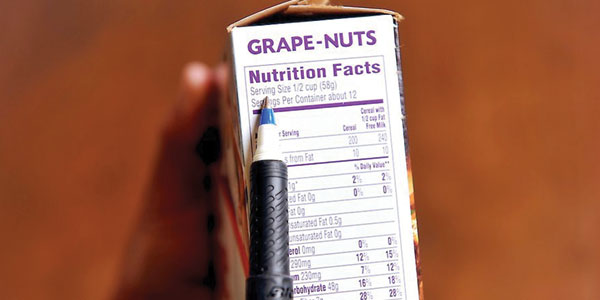
Carbohydrates: All net carbs will be transformed into glucose (sugar) in the blood. Even when their flavor is not sweet, they can cause obesity and worsen diabetes.
According to the amount of fiber they contain, carbohydrates can be classified as: “complex” carbohydrates that are the ones that have a higher amount of fiber and are the healthiest because they allow a slow increase in blood sugar (lower glycemic index). Or they can be “simple” carbohydrates, including refined sugars which have a lower amount of fiber.
Simple carbohydrates can cause a fast increase of sugar (glucose) in the blood (that means they have a high glycemic index). Simple carbohydrates can control our hunger immediately, but they are more harmful than complex carbohydrates. In response to a rapid rise in blood sugar, the complex carbohydrates will cause our body to produce an excess of insulin. And insulin make us gain weight. Ideally, we should consume more amounts of fiber and protein and fewer amounts of refined sugars.
Dietary fiber: Men should ingest 38 g and women need 25 g of fiber per day. The fiber is not absorbed and helps our intestinal function. It also increases our satiety and allows a slow increase in blood sugar. Fiber is naturally present in vegetables, especially green leafy vegetables and fruits, but also in oats, whole wheat, wild rice and other whole grains.
Sugars: In a label you can find natural sugars and added sugars. These usually have a high glycemic index and therefore are harmful. Because they can increase our sugar (glucose) in the blood too fast causing a rapid increase in the level of insulin.
These sugars cause weight gain in two ways. First, they force the pancreas to produce more insulin to avoid a high level of glucose in the blood that can damage brain function. Insulin lowers glucose and promotes its storage as fat. On the other hand they make us hungry again, 1-3 hours after consuming them because the insulin lowers the blood glucose level and this stimulates the appetite.
The natural sugars are what gives the sweet flavor to fruits and vegetables such as sweet potatoes or corn.
__________________________________________________________________________________________
Consejos sobre cómo leer e interpretar etiquetas de alimentos
Carbohydratos: Todos los carbohidratos netos se van a transformar en glucosa (azúcar) en la sangre aunque el sabor no sea dulce y pueden causar obesidad y empeorar la diabetes.
De acuerdo con la cantidad de fibra que contienen; los carbohidratos se pueden clasificar como: carbohidratos “complejos” que son los que tienen una mayor cantidad de fibra y son los más saludables, ya que permiten un lento aumento en el azúcar en la sangre (menor índice glucémico) o pueden ser carbohidratos “simples”, incluyendo los “azúcares refinados”, que tienen una menor cantidad de fibra.
Los carbohidratos simples puede causar un rápido aumento de azúcar (glucosa) en la sangre (o sea que tienen un alto índice glucémico). Los carbohidratos simples pueden controlar nuestro hambre de inmediato, pero son más dañinos que los carbohidratos complejos, ya que harán que nuestro cuerpo produzca un exceso de insulina como respuesta a una suba rápida de azúcar en la sangre, la insulina a su vez nos hace subir de peso. Idealmente debemos consumir más cantidades de fibra y proteína y menos cantidades de azúcares refinados.
Fibra dietética: los hombres deben ingerir 38 g / día y las mujeres 25 g de fibra al día. La fibra no se absorbe y ayuda a nuestra función intestinal, aumenta nuestra saciedad y permite un lento aumento de azúcar en la sangre. La fibra está naturalmente presente en los vegetales, especialmente verduras de hoja verde y frutas, pero también en la avena, trigo integral, arroz salvaje y otros granos enteros.
Azúcares: En una etiqueta se incluyen los azucares naturales y los azúcares añadidos. Estos tienen por lo general un alto índice glucémico y por lo tanto son perjudiciales porque pueden aumentar nuestra azúcar (glucosa) en la sangre demasiado rápido causando un rápido aumento en el nivel de insulina.
Estos azúcares causan aumento de peso de dos maneras; obligan a que el páncreas produzca más insulina para evitar un elevado nivel de glucosa en la sangre que puede dañar la función del cerebro. La insulina baja la glucosa y promueve su almacenamiento en forma de grasa. Por otro lado nos hacen dar hambre otra vez , 1-3 horas después de consumirlos porque la insulina baja el nivel de glucosa en sangre y esto estimula el apetito.
Los azúcares naturales son los que le dan el sabor dulce a las frutas y vegetales como batatas o maíz.
Dr. Myriam Ensling Internal Medicine and Obesity
5401 College Blvd. Suite 204
Leawood, KS 66211
(913) 317-5040 – (913) 317-5044
enslingmedicine@gmail.com
Escúchame el 1er lunes de cada mes en La Grande 1340 am, a las 1:30pm.









